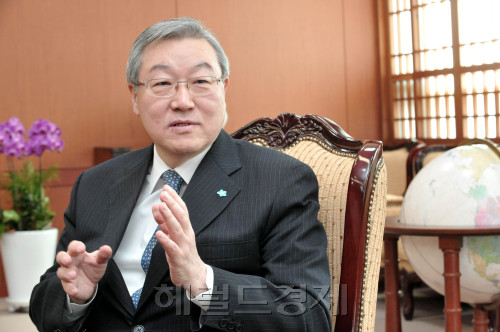Minister Kim: North Korean nuclear issue will be raised in bilateral talksParticipating
With the 2012 Seoul Nuclear Security Summit coming up in a few days, Foreign Minister Kim Sung-hwan said he expected participating countries to individually announce specific action plans to strengthen nuclear security.
“Whereas the Washington Nuclear Security Summit in 2010 served mainly as a venue to proclaim a shared awareness of the need for nuclear security, the upcoming Seoul summit is expected to produce more advanced and concrete action plans through the Seoul Communiqu, and make tangible progress,” Kim recently told The Korea Herald.
“We expect further announcements to be made on specific actions concerning nuclear security, including the elimination and minimization of weapons-usable nuclear materials such as highly enriched uranium or plutonium, the signing or ratification of key nuclear security instruments and contribution to the IAEA Nuclear Security Fund.”


As the fifth-largest nuclear power producer in the world, Korea will introduce to participating states how Korea enhanced transparency and accountability in nuclear safety, including the establishment of the Nuclear Safety and Security Commission last October, an independent agency that oversees nuclear safety and security issues, he said.
Although the Seoul nuclear security summit involves talks about how to prevent nuclear materials from falling into the hands of non-state actors such as terrorists, the North Korean nuclear issue will be naturally mentioned on the sidelines of the summit, Kim noted.

“As major leaders including the leaders of the participating countries in the six-party talks will attend the Seoul summit, the North Korean nuclear issue will naturally be discussed on separate occasions such as bilateral talks on the margins of the summit,” Kim said.
President Lee Myung-bak is scheduled to have around 25 bilateral summits starting Saturday.
“The very fact that 58 world leaders are gathering in Seoul to engage in discussions on key nuclear issues will serve as a unified message from the international community that the North should eliminate any material it may possess,” he said.
To make the Seoul summit a success, the Korean government has made efforts to raise public awareness of the significance of the event, Kim said.
Working with government officials, about 800 volunteers are serving as liaison officers, e-reporters and logistics operators.
According to the organizers, some 3,800 journalists from 39 countries have completed the media registration as of Friday to cover the event.
On Monday at dinner meeting, participating leaders will first review the progress in the commitments made by 30 or more countries at the 2010 Washington Summit on voluntary national measures to enhance nuclear security, Kim said.
After a Tuesday morning session and luncheon meeting, leaders will adopt the Seoul Communique, which will identify specific goals and practical measures to realize the vision of a “four-year lockdown” of all vulnerable nuclear materials, he said.
By Kim Yoon-mi
(yoonmi@heraldcorp.com)



![[From the Scene] Monks, Buddhists hail return of remains of Buddhas](http://res.heraldm.com/phpwas/restmb_idxmake.php?idx=645&simg=/content/image/2024/04/19/20240419050617_0.jpg&u=20240419175937)

